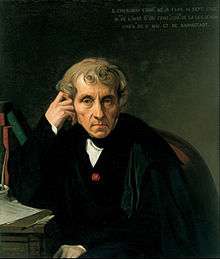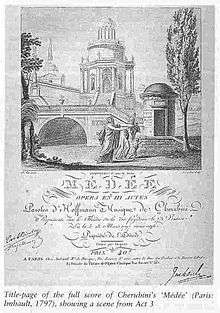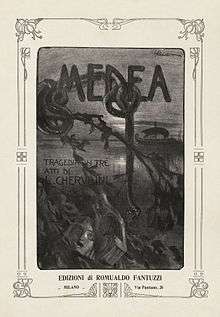Médée (Cherubini)
| Luigi Cherubini |
|---|
 |
|
Operas
|
Médée is a French language opéra-comique by Luigi Cherubini. The libretto by François-Benoît Hoffmann (Nicolas Étienne Framéry) was based on Euripides' tragedy of Medea and Pierre Corneille's play Médée.[1]
The opera was premiered on 13 March 1797 at the Théâtre Feydeau, Paris. It met with a lukewarm reception and was not immediately revived. During the nineteenth- and most of the twentieth-century, it was usually performed in Italian translation as Medea, with the spoken dialogue replaced by recitatives not authorised by the composer. More recently, opera companies have returned to Cherubini's original version.
The long-lost final aria, which Cherubini appears to have blanked out in his original manuscript, was discovered by researchers from the University of Manchester and Stanford University by employing x-ray techniques to uncover the blackened out areas of Cherubini's manuscript. [2]
Performances and Versions

Several versions of the opera were produced and staged in Italian and German:
- 1802: The Italian translation was premiered in Vienna on 6 November 1802.
- 1809: The shortened version of the Italian translation was given in Vienna, where Cherubini produced a version which omitted some 500 bars of music
- 1855: Franz Lachner's German version was given in Frankfurt. This was based on the shortened Vienna version, but with recitatives composed by Lachner which replaced the spoken dialogue.
- 1865: The United Kingdom premiere was given in Italian at Her Majesty's Theatre on 6 June, with recitatives by Luigi Arditi, and Thérèse Tietjens in the title role. Cherubini's son and grandson were among the audience. This performance received a highly enthusiastic review in The Times.[3]

- 1909: The Italian translation of the Lachner version by Carlo Zangarini was prepared for its Italian premiere at the Teatro alla Scala, on 30 December 1909, and starred Ester Mazzoleni. It was this hybrid version that was revived in 1953 for Maria Callas.
Callas Revivals (1953-1962)
- Perhaps the most famous 20th-century revival of the work was in Florence in 1953, with Maria Callas in the title role, conducted by Vittorio Gui. Callas learned and performed the role within a week, to critical acclaim. The production was so successful that the Teatro alla Scala decided to stage this opera during the opening week of its 1953-1954 season, with Leonard Bernstein filling in for an indisposed Victor de Sabata and staged by Margherita Wallmann.
- Callas performed the role throughout the 1950s and early 1960s, with possibly the most famous production being by the Dallas Opera in 1958, conducted by Nicola Rescigno (with Jon Vickers as Jason) and directed by the Greek director Alexis Minotis. This production traveled to the Royal Opera House, Covent Garden, in London in 1959, and to La Scala (where a few minutes of it were filmed) in 1961-62. It was in these performances that Callas made her last appearances in Italy.
Late Twentieth-Century revivals
- 1984 - 1995: Revivals of the original French version were given at the Buxton Festival on 28 July 1984; at The Royal Opera House, Covent Garden on 6 November 1989; and at the Valle d'Itria Festival on 4 August 1995.
- 1996: The shortened Vienna version was given in an English translation and sung in English by Opera North in Leeds in April 1996.
- March 1997: A Bicentennial production by Opera Quotannis presented an unabridged (text and music) version (with a period-instrument orchestra) of the original opéra-comique at Alice Tully Hall, Lincoln Center, commemorating the bicentennial of the premiere. Bart Folse conducted Brian Morgan's stylized production, which featured Phyllis Treigle (in the title role), Carl Halvorson (as Jason), D'Anna Fortunato (as Néris), David Arnold (as Créon), Thaïs St Julien (as Dircé), and Jayne West and Andrea Matthews (as the Handmaidens of Dircé). Peter G. Davis, in New York magazine, wrote that "Opera Quotannis delivers Cherubini's Médée in all its original glory…. The occasion proved that the real Médée is indeed a masterpiece. Its weak sister, the doctored Medea we've been hearing all these years, should now be permanently set aside." Newport Classic subsequently recorded the production for Compact Disc.
The role of Médée is famed for its difficulty. Other famous interpreters of the role in the 20th century included Anna Caterina Antonacci, Dame Josephine Barstow, Montserrat Caballé, Eileen Farrell, Marisa Galvany, Leyla Gencer, Dame Gwyneth Jones, Nadja Michael, Maralin Niska, Magda Olivero, Leonie Rysanek, Sylvia Sass, Anja Silja, Dunja Vejzovic, and Shirley Verrett.
Roles
| Role | Voice type | Premiere cast, 13 March 1797[4] (Conductor: - ) |
|---|---|---|
| Médée | soprano | Julie-Angélique Scio |
| Dircé, Créon's daughter | soprano | Rosine |
| Néris, Médée's slave | mezzo-soprano or contralto | Auvray |
| Jason | tenor | Pierre Gaveaux |
| King Créon | bass | Alexis Dessaules |
| Captain of the Guard | speaking role | Legrand |
| Two Handmaidens of Dirce | sopranos | Verteuil, - |
| Two children | silent roles | |
| Chorus: Servants of Dircé, Argonauts, priests, warriors, people of Corinth | ||
Synopsis
- Place: Corinth
- Time: Antiquity
Act 1
Outside the palace of King Créon
Dircé is preparing for her wedding to Jason. Years ago, Jason had stolen the golden fleece with the help of Médée, who had betrayed her family and established a relationship with Jason, the result of which was two children. Although Jason has since abandoned Médée, she reappears and demands that he return to her. Jason refuses and Médée curses him, swearing vengeance.
Act 2
Inside the palace
In despair, Médée is encouraged by her slave, Néris, to leave the city. Créon then appears and orders that Médée leave. She asks for one more day with her children and, after the king agrees, she appears to be calmer and gives Néris two wedding presents to take to her rival.
Act 3
Between the palace and the temple
Néris brings the two children out to where Médée is waiting. Sounds of lamentation are heard from within the palace and it is discovered that one of Médée's wedding presents has poisoned Dircé. An angry crowd gathers and Néris, Médée, and the children take refuge in the temple. The two women reappear with Médée grasping a blood-stained knife with which she has killed her two children. The temple, to which Médée returns, goes up in flames.
Recordings
Original French version:
| Year | Cast (Médée, Dircé, Néris, Jason, Créon) |
Conductor, Opera House and Orchestra |
Label[5] |
|---|---|---|---|
| 1995 | Iano Tamar, Patrizia Ciofi, Magali Damonte, Luca Lombardo, Jean-Philippe Courtis |
Patrick Fournillier Orchestra Internazionale d'Italia Opera (Live performance at the Palazzo Ducale, Martina Franca during the XX Festival della Valle d'Itria, August) |
Audio CD: Nuova Era Cat: 7253/54 Nuova Era, Cat: 231687 (Reissue 2008) |
| 1997 | Phyllis Treigle, Thaïs St Julien, D'Anna Fortunato, Carl Halvorson, David Arnold |
Bart Folse, Brewer Chamber Orchestra and the Chorus Quotannis |
Audio CD: Newport Classic Cat: NPD 85622/2 |
Lachner version, in Italian translation:
| Year | Cast (Medea, Glauce, Neris, Giasone, Creonte) |
Conductor, Opera House and Orchestra |
Label[5] |
|---|---|---|---|
| 1953 | Maria Callas, Maria Luisa Nache, Fedora Barbieri, Gino Penno, Giuseppe Modesti |
Leonard Bernstein, Teatro alla Scala Orchestra and Chorus, (Recording of a performance at La Scala, 10 December) |
Audio CD: EMI |
| 1957 | Maria Callas, Renata Scotto, Miriam Pirazzini, Mirto Picchi, Giuseppe Modesti |
Tullio Serafin, Teatro alla Scala Orchestra and Chorus |
Audio CD: EMI Cat: CDMB-63625 |
| 1959 | Maria Callas, Joan Carlyle, Fiorenza Cossotto, Jon Vickers, Nicola Zaccaria |
Nicola Rescigno, Orchestra and Chorus of the Royal Opera House, Covent Garden. (Recording of a performance by the BBC at the Royal Opera House, 30 June) |
Audio CD: ICA Classics Cat: ICAC 5110. (Issued under licence from the BBC, London) |
| 1967 | Dame Gwyneth Jones, Pilar Lorengar, Fiorenza Cossotto, Bruno Prevedi, Justino Díaz |
Lamberto Gardelli Orchestra and Chorus of Accademia Nazionale di Santa Cecilia |
Audio CD: Decca «Double» Cat: 452 611-2 |
| 1977 | Sylvia Sass, Magda Kalmár, Klára Takács, Veriano Luchetti, Kolos Kováts |
Lamberto Gardelli, Hungarian Radio and Television Symphony Orchestra and Chorus |
Audio CD: Hungaroton Cat: HCD 11904-05-2 |
References
Notes
- ↑ Information from Operone website
- ↑ "Cherubini opera restored after 200 years" on bbc.co.uk, 14 June 2013. Retrieved 15 June 2013
- ↑ Review: "Her Majestys [sic] Theatre". In The Times, Wednesday, June 7, 1865, p. 12, col. F.
- ↑ Casaglia, Gherardo (2005).[http://www.amadeusonline.net/almanacco?r=&alm_giorno=13&alm_mese=03&alm_anno=1797&alm_testo=M%E9d%E9e "Médée, 13 March 1797"]. Almanacco Amadeus (Italian).
- 1 2 Recordings on operadis-opera-discography.org.uk